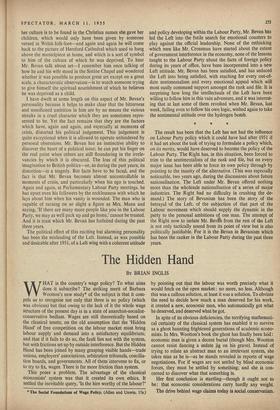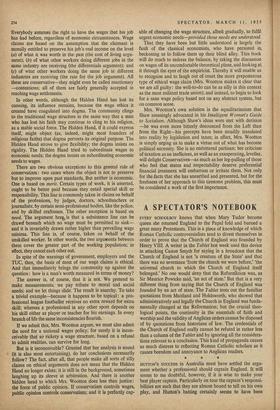The Hidden Hand
BY BRIAN INGLIS WHAT is the country's wage policy? To what aims does it subscribe? The striking merit of Barbara Wootton's new study* of the subject is that it com- pels us to recognise not only that there is no policy (which was obvious) but that owing to the lack of it the whole wage structure of the present day is in a state of anarchist-socialist- conservative bedlam. Wages are still theoretically based on the classical tenets; on the old assumption that the 'Hidden Hand' of free competition on the labour market must bring labour supply and demand into a satisfactory equilibrium; and that if it fails to do so, the fault lies not with the system, but with frictions set up by outside interference. But the Hidden Hand has been joined by many grasping visible hands—trade unions, employers' associations, arbitration tribunals, concilia- tion boards, and governments. All of them intervene to fix, or to try to fix, wages. There is far more friction than system.
This poses a problem. The advantage of the classical economists' system was that it created its own ethics. It settled the inevitable query, 'Is the hire worthy of the labour?'
• The Social Foundations of Wage Policy. (Allen and Unwin, 15s.)
by pointing out that the labour was worth precisely what it would fetch on the open market: no more, no less. Although this was a callous solution, at least it was a solution. To obviate the need to decide how much a man deserved for his work, it created a new, economic man, who automatically got what he deserved, and deserved what he got.
In spite of its obvious deficiencies, the terrifying mathemati- cal certainty of the classical system has enabled it to survive as a ghost haunting frightened generations of academic econo- mists. In Mrs. Wootton's book the ghost has finally been laid: economic man is given a decent burial (though Mrs. Wootton cannot resist dancing a sedate jig on his grave). Instead of trying to relate an abstract man to an irrelevant system, she takes man as he is—as he stands revealed in reports of wage negotiations. For if wages are not settled by blind economic forces, they must be settled by something; and she is con- cerned to discover what that something is.
Her first conclusion is startling—though it ought not to be: that economic considerations carry hardly any weight.
The drive behind wage claims today is social conservatism. Everybody assumes the right to have the wages that his job has had before, regardless of economic circumstances. Wage claims are based on the assumption that the claimant is morally entitled to preserve his job's real income on the level (a) of what it was worth in the past (the cost of living argu- ment); (b) of what other workers doing different jobs in the same industry are receiving (the differentials argument); and (c) of what other workers doing the same job in different industries are receiving (the rate for the job argument). All these are conservative—they might even be called reactionary —contentions; all of them are fairly generally accepted in reaching wage settlements.
In other words, although the Hidden Hand has lost its cunning, its influence remains, because the wage ethics it created have coagulated into dogma. The community clings to the traditional wage structure in the same way that a man who has lost his faith may continue to cling to his religion, as a stable social force. The Hidden Hand, if it could express itself, might object (as, indeed, might most founders of religious faiths) that dogma perverts its original purpose. The Hidden Hand strove to give flexibility; the dogma insists on rigidity. The Hidden Hand tried to subordinate wages to economic needs; the dogma insists on subordinating economic needs to wages.
There are two obvious exceptions to this general rule of conservatism : two cases where the object is not to preserve but to improve upon past standards. But neither is economic. One is based on merit. Certain types of work, it is asserted, ought to be better paid because they entail special skill or responsibility. This line is commonly taken in claims on behalf of the professions, by judges, doctors, schoolteachers or journalists; by certain semi-professional bodies, like the police; and by skilled craftsmen. The other exception is based on need. The argument hers, is that a subsistence line can be drawtt beneath which no wage must be permitted to sink— and it is invariably drawn rather higher than prevailing wage minima. This line is, of course, taken on behalf of the unskilled worker. In other words, the two arguments between them cover the greater part of the working population; in effect, they cancel each other out.
In spite of the warnings of government, employers and the TUC, then, the basis of most of our wage claims is ethical. And that immediately brings the community up against the question : how is a man's worth measured in terms of money?
The answer is. of course, that it is not. We pretend to make measurements; we pay tribute to moral and social needs; and we let things slide. The result is anarchy. To take a trivial example—because it happens to be topical : a pro- fessional league footballer receives no extra reward for extra skill; whereas a professional in any other sport depends on his skill either as player or teacher for his earnings. In every branch of life the same inconsistencies flourish.
If we admit this, Mrs. Wootton argues, we must also admit the need for a national wages policy; for surely it is incon- ceivable that so rickety a wage structure, based on a refusal to admit realities, can survive for long.
But is it inconceivable? Granted that her analysis is sound (it is also most entertaining), do her conclusions necessarily follow? The fact, after all, that people make all sorts of silly claims on ethical arguments does not mean that the Hidden Hand no longer exists; it is still in the background, sometimes laughing up its sleeve at arbitration. And there is another hidden hand to which Mrs. Wootton does less than justice: the force of public opinion. If conservatism controls wages, public opinion controls conservatism; and it is perfectly cap- able of changing the wage structure, albeit gradually, to fulfil urgent economic needs—provided those needs are understood.
That they have been but little understood is largely the fault of the classical economists, who have persisted in. beckoning us to follow them up their blind alley. This book will do much to redress the balance, by taking the discussion on wages off its uncomfortable theoretical plane, and looking at it through the eyes of the empiricist. Thereby it will enable us to recognise and to laugh out of court the more preposterous type of ethical wage claim (Mrs. Wootton makes it clear that we are all guilty : the well-to-do can be as silly in this context as the most militant trade union); and instead, to begin to look for a sane wage policy based not on any abstract system, but on common sense.
Mrs. Wootton's own solution is the equalitarianism that Shaw amusingly advocated in his Intelligent Woman's Guide to Socialism. Although Shaw's ideas were met with derision —he was even more bitterly denounced from the Left than from the Right—his precepts have been steadily translated into reality by legislation and taxes; in effect, Mrs. Wootton is simply urging us to make a virtue out of what has become political necessity. She is no embittered partisan; her criticism of taxation as an inefficient, as well as an exasperating, leveller, will delight Conservatives—as much as her leg-pulling of those who feel that status and respectability deserve preferential financial treatment will embarrass or irritate them. Not only for the facts that she has unearthed and presented, but for the freshness of her approach to this tiresome problem, this must be considered a work of the first importance.











































 Previous page
Previous page